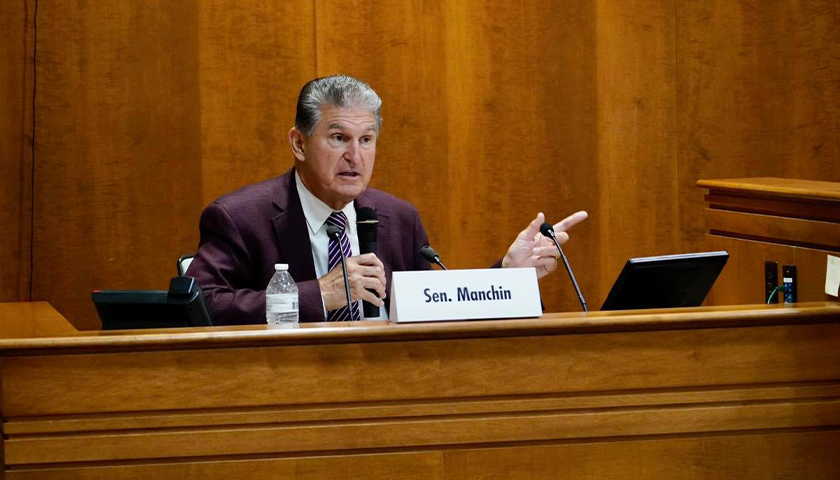by Casey Harper
Tense negotiations have continued for months on Democrats’ proposed several trillion dollars in federal spending, leading to major changes for the plan. Notably, Democrats now say the $3.5 trillion “human infrastructure”plan will likely end up closer to $2 trillion, though that figure still remains too high for many lawmakers.
At the same time, President Joe Biden has still been unable to rally Congress around a method to actually pay for the proposal, which Biden claims will add nothing to the national debt.
Democrats’ separate, roughly $1 trillion infrastructure bill appeared set to pass in recent weeks, but some progressive Democrats withheld their support fearing that giving up their votes would cost them leverage in making sure the larger reconciliation bill is passed and signed into law.
So far, the Democrats’ bill has been whittled down with less spending and fewer tax increases, but a deal has not been reached. Some Democrats suggested a vote on both the infrastructure and the reconciliation bills could happen this week, but U.S. Sen. Joe Manchin, D-W.V., told reporters last week that he doesn’t see an agreement coming anytime soon.
The lack of compromise has left many progressive Democrats frustrated, with U.S. Rep. Alexandria Ocasio Cortez, D-N.Y. and U.S. Sen. Bernie Sanders, I-Vt., publicly attacking U.S. Sens. Kyrsten Sinema, D-Ariz. and Manchin, respectively.
During tense negotiations last week, Manchin reportedly told Sanders that he was willing to spend zero dollars on Biden’s plan, killing it entirely if necessary. He previously set a target number at $1.5 trillion, but has grown frustrated with other Democrats, notably Sanders, who published an opinion piece in Manchin’s home state calling on him to vote for the legislation.
Meanwhile, many of Biden’s proposed funding mechanisms for the proposal have come under fire.
Biden said last week that raising the corporate tax rate was likely off the table, a move that may help appease moderate Democrats like Sinema, but will likely frustrate more liberal members of the party hoping to use those funds to combat climate change and other spending items.
“I don’t think we’re going to be able to get the – look, when you’re in the United States Senate and you’re president of the United States and you have 50 Democrats, every one is a president,” Biden said during a CNN Town Hall Thursday. “Every single one. So you’ve got to work things out.”
Biden had previously proposed raising the corporate tax rate from 21% to 28%. Other changes to the plan include the removal of free community college tuition provisions and cutting paid family leave down to four weeks, though details of the plan are still in flux.
And Biden’s proposal to beef up IRS auditing and monitoring has become a major point of contention and another point of negotiation. Biden initially proposed requiring banks turn over information to the IRS on all bank accounts with at least $600 in transactions, a plan that was roundly criticized because it would sweep up information on nearly all Americans.
In response, Democrats have proposed raising the threshold to $10,000, but that plan has still come under fire.
The American Bankers Association, among other groups, announced their opposition to the $10,000 threshold plan. Rob Nichols, president and CEO of the ABA, said the plan still goes “too far,” and critics argue it will still collect information unnecessarily on millions of Americans.
“Every time this proposal changes, it gets worse,” said Ryan Donovan, Credit Union National Association (CUNA) executive vice president and chief advocacy officer. “For the country’s minimum wage workforce, there is no fundamental difference between a $600 reporting threshold and a $10,000 reporting threshold. Now proponents expect credit unions and banks to play arbiter, declaring what does and doesn’t meet proposed exceptions like wages and down payments. They’ve just taken something very invasive and made it incredibly more so while turning an average compliance bad dream into a waking nightmare. The revised proposal is a huge leap in the wrong direction.”
– – –
Casey Harper is a Senior Reporter for the Washington, D.C. Bureau. He previously worked for The Daily Caller, The Hill, and Sinclair Broadcast Group. A graduate of Hillsdale College, Casey’s work has also appeared in Fox News, Fox Business, and USA Today. Harper contributes to The Center Square.
Photo “Sen. Manchin” by Senator Joe Manchin III.





